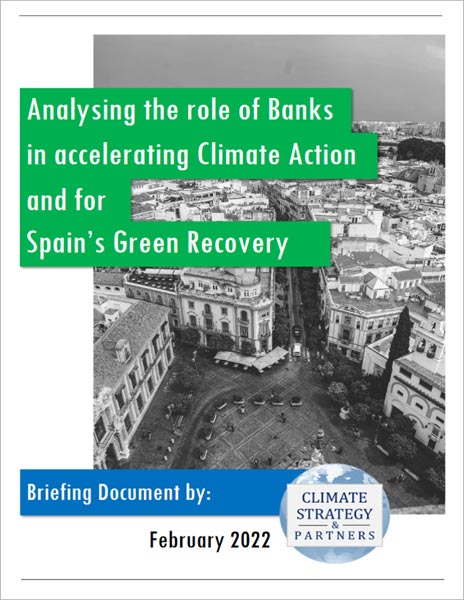
Peter Sweatman, Author
Financial institutions play a key role in a world post Covid-19 focused on rebuilding economies with a green recovery.
Published in February 2022
In this report, Climate Strategy analyses the climate action plans from Spain's three largest banking groups: BBVA, Banco Santander and CaixaBank. With over 70% of the banking market and 55% of assets under management, the alignment of these three large banks with the Paris Agreement is key to ensure Spain's green recovery.
According to Peter Sweatman, CEO of Climate Strategy: "With an unprecedented injection of European money into the Spanish economy, 2022 is key for the acceleration of banks’ climate action in order to channel these funds towards sustainable investments and the decarbonization of their clients."
CS notes that BBVA, Banco Santander and CaixaBank have joined international leaders with their COP26 commitments under the Glasgow Financial Alliance for Net Zero (GFANZ). While these commitments are positive progress in the financial sector's climate ambition, several reports - and the European Central Bank's (ECB) own analysis - experts that all banks still have a lot of work to do to align with best practices in climate action.
This report assesses the work of BBVA, Banco Santander and CaixaBank in detail and finds that, while all three banks lead in several international best practices, more specific and sectoral efforts are needed on their part to develop comprehensive climate action plans in line with the Paris Agreement's 1.5ºC target. "While the three banks have made progress in developing sectoral climate targets and good climate governance measures, we expect to see new comprehensive climate action plans that integrate all international recommendations and are aligned with the Paris Agreement," explains Peter Sweatman.
Using as a frame of reference the Best Practice Guide produced by the Spanish Green Growth Group –under the leadership of CS- for COP26, which compiles international best practices in the development of climate action plans, this report summarizes its findings on banking groups in three pillars:
Likewise, this report examines the climate actions taken by the asset managers of BBVA, Banco Santander and CaixaBank. The results show that Spanish asset managers lag behind their host banks in all three pillars analyzed. Notably, none have yet announced:
Asset managers should therefore accelerate the development of robust climate action plans to keep the pace of their banking groups.
CS takes into account that 2022 is a key year for the improvement and acceleration of Spanish banks' climate action. Spain will be the recipient of €140 billion from the NextGenerationEU funds, with almost 40% of these funds contributing to green investments by 2026. Therefore, Spanish banking groups can be a strategic distribution channel for this unprecedented public input.
At present, financial institutions play a key role in post Covid-19 efforts focused on a green recovery. Through the objective assessment of the state of the three largest Spanish banks, this report intends to contribute to the acceleration of their climate actions, and therefore add to the green recovery efforts in Spain and in Europe.
